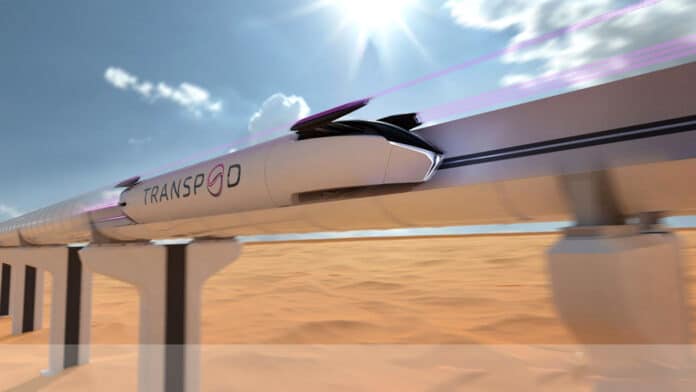A Canadian-French company, TransPod, has unveiled FluxJet, an industry-defining innovation that transforms the way we live, work, and travel.
Based on groundbreaking innovations in propulsion and fossil-fuel-free clean energy systems, the FluxJet is a fully electric vehicle that is effectively a hybrid between an aircraft and a train. Featuring technological leaps in contactless power transmission and a new field of physics called veillance flux, the FluxJet travels in a protected guideway at over 1000 km/h (621 mph) – faster than a jet and three times as fast as a high-speed train.
TransPod is also planning to build a groundbreaking network system called the TransPod Line to connect the cities of Calgary and Edmonton in Alberta, Canada. It claims to be different than any other vacuum tube train system because it’s based on smart infrastructure that significantly reduces operation and maintenance costs.
Once the TransPod Line is in operation, it will cost passengers approximately 44% less than a plane ticket to travel the corridor and reduce CO2 emissions by 636,000 tonnes per year. They would also get to the destination much faster, with FluxJet tubes departing every 2 minutes.
At TransPod’s unveiling event in Toronto, TransPod presented a scaled-down FluxJet tube. The almost 1-tonne FluxJet vehicle demonstrated a take-off, travel, and landing procedure within its guideway. The vehicle was the result of the research and development process that began several years ago.
“This milestone is a major leap forward,” said Ryan Janzen, co-founder, and CTO, TransPod. “The FluxJet is at a nexus of scientific research, industrial development, and massive infrastructure to address passengers’ needs and reduce our dependence on fossil-fuel-heavy jets and highways.”
Most recently, TransPod confirmed $550 million US finance for FluxJet development and announced the next phase of an $18 billion US infrastructure project to build the TransPod Line. If all goes according to plan, the future inter-city line is set to kick off construction by 2027.
